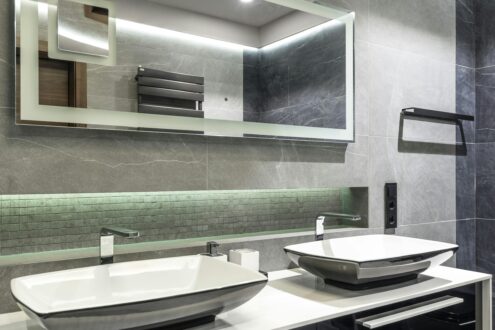
Photo by Theme Photos on Unsplash
Few would put “convenience” and “renovation” in the same sentence, except for when using them as contrary definitions, as I just did. The truth is that having any element of your home restructured and altered can be a pain, even if the final result is great.
After all, even if the roofing contractors you use are highly pleasant, greatly effective, awesome communicators and know exactly what your property needs, you’re still going to do without a roof while they replace it. That takes some planning. You’ll likely hope it doesn’t rain.
Is it possible to make a household renovation easier for yourself? After all, it’s not like life stops just because you have your kitchen torn out and reinstalled, although you might be eating differently for a couple of weeks.
In the interest of convenience (yes, that sought-after virtue), let’s consider some tips you might think about using:
Overcommunicate With Your Contractors
Any decent renovation will most often have a clear and open line of communication with the team doing the work. You should make sure you know exactly what is happening each day, what time they will arrive, and what they need from you as a minimum. Setting up a quick chat at the end of each workday to review the progress and discuss the plan for the next day can clear up any issues too, and the good contractors know you need this.
You should never feel hesitant to ask a question, even if it feels silly or obvious. You’re paying for this work after all, and so understanding the timeline and the process is going to help you balance the changes in your schedule – for example, they might need you to vacate the property entirely if they’re knocking down walls for a couple of days, and you deserve to know how they’ll secure the open areas with fences in the meantime. Look for contractors that have a reputation for putting their clients at ease, and you’ll be on a good path.
Set Up A Temporary Replacement Zone
If you’re renovating a critical room like the kitchen or a main bathroom, life still needs to continue while the work is being done. You might need to take time to set up a functional, temporary space elsewhere in your home to make the disruption feel much more manageable. For a kitchen, this could require moving a microwave, a slow cooker, and basic dinnerware into a laundry room or garage, and making sure you have a stable surface and a trusted power source to help.
Just be careful. For example, a hot plate still needs some good ventilation around it and you need to keep your kids well clear of any hot surfaces. You may also need to think about dust sheets and dividers to prevent any of the work going on in the house from harming you. You may also need to talk to a trusted neighbor – a generous person might be willing to let you use their bathroom while yours is being reinstalled. You could offer the same to them in future.
Clear The Work Area Completely
Of course, every single item that can be removed from the renovation area should be taken out. As a minimum you may be asked to clear furniture, take down art, remove curtains, and empty every cabinet and drawer. Anything left behind will need to be protected, moved by the workers, and will ultimately slow down their progress.
If it’s done before they arrive, it’ll give the workers an immediate, easy access area to start their job, which can hugely speed up the overall timeline. If you don’t have enough space in the rest of your home to hold the displaced items, you’ll be happy to know a storage facilities are generally very easy and affordable, especially if only used for a few days. Perhaps you could even keep large amounts of your belongings there until you’re ready to decorate that final space.
Pre-Select Every Single Material
Sometimes, one of the unexpected reasons renovations get delayed is because the homeowner hasn’t actually finalized the choice for the tiles, the paint color, or the light fixtures when the contractor is ready to install them. All decisions about finishes, fixtures, and materials should be made and ordered well in advance of the project start date.
It sounds obvious, but you’d be surprised how little it is for some. It may be that materials need to be custom-ordered and can take weeks to arrive. Convenience isn’t always possible, but it certainly helps if you’ve don everything to welcome it before the harder work starts!
Establish A Buffer Budget And Timeline
Very few home renovations ever finish on time or on budget, no matter how much planning is involved. Sometimes there are issues you couldn’t preidct, like discovering old water damage behind a wall or needing to reroute unexpected plumbing. Sods law states it will also happen at the most inconvenieint time, and always pop up and add to the cost and time frame. You should mentally and financially prepare for these delays from the start so they don’t feel utterly exasperating.
We’d suggest a good preparation for that involves having a contingency fund of around ten to twenty per cent to your total budget, so you ensure you aren’t financially stressed if you have to deal with issues from there. Moreover, setting an expected completion date a few weeks after the date the contractor gives you allows you to plan your life without undue pressure if things run on. That’s not to say the work or budget is going to be perfectly within these lines, but at least you don’t have tiny margins you can never budge on.
Schedule A Deep Clean For The End
Renovations are dusty, as you can likely imagine or may have experienced.
Hiring a cleaning crew to handle the cleanup required to remove construction dust safely and efficiently is going to be such a helper, because the last thing anyone wants to do after seeing their house get knocked down and reinstalled is start cleaning everything. The contractors should have tidied up but they won’t make the space spotless, so planning that saves you some hassle.
With this advice, we believe you’ll find it easier to deal with any and all household renovations.











Leave a Reply